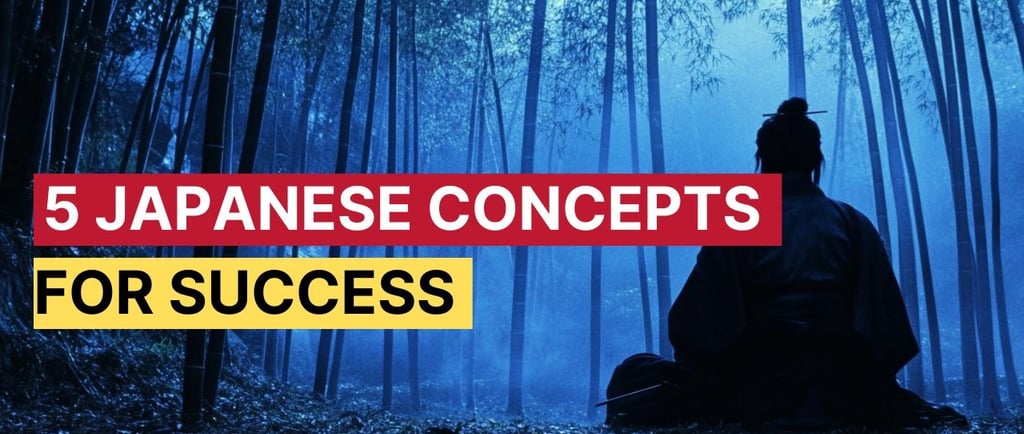5 Japanese Concepts That Will Help You Achieve Your Goals
Discover five timeless Japanese principles—Ikigai, Kaizen, Wabi-Sabi, Gaman, and Shu-Ha-Ri—that can help you live with purpose, improve consistently, embrace imperfection, stay resilient, and master your craft. Whether you're building a business, writing a book, or transforming your life, these mental models offer clarity, motivation, and depth for your journey.
5/19/20253 min read


Japanese culture has long been admired for its elegance, discipline, and philosophical depth. Some of its core ideas offer not just cultural insight—but powerful mental models for living a better, more focused life.
If you’re chasing big goals—whether it’s building a business, writing a book, transforming your health, or simply becoming the best version of yourself—these five Japanese concepts can serve as your guide.
Here’s a deep dive into five timeless Japanese principles that can help you stay motivated, grow consistently, and reach your goals with clarity and grace.
1. Ikigai (生き甲斐) – “Reason for Being”
What it means:
Ikigai is about finding purpose in life. It's the beautiful intersection of four things:
What you love
What you’re good at
What the world needs
What you can be paid for
How it helps you:
When your goals align with your ikigai, you’ll tap into a deeper sense of meaning. You’ll find motivation not just from external rewards, but from within. It makes the hard days more bearable, and the good days even more satisfying.
How to implement:
Take time to reflect:
What activities make you lose track of time?
What do people often ask you for help with?
What problems in the world move you emotionally?
Sketch out a four-circle Venn diagram and see where the overlaps occur. Use this to guide the goals you choose—and say “no” to the ones that don’t align.
2. Kaizen (改善) – “Continuous Improvement”
What it means:
Kaizen is the idea that small, daily improvements add up over time to massive change. Instead of chasing quick wins, you focus on getting just 1% better every day.
How it helps you:
Kaizen takes the pressure off perfection. You don’t need to accomplish everything today. You just need to do a little bit better than yesterday. That mindset builds confidence, habits, and long-term progress.
How to implement:
Break your big goals into daily habits. For example, if your goal is to get fit, start with 10 minutes of movement each day.
Track your progress weekly and ask, “What’s one small thing I can improve?”
Celebrate small wins—they are the building blocks of long-term success.
Kaizen is powerful because it compounds. Like interest in a savings account, small efforts grow into huge results over time.
3. Wabi-Sabi (侘寂) – “Beauty in Imperfection”
What it means:
Wabi-sabi teaches us to appreciate the imperfect, the transient, and the incomplete. It’s the beauty found in things that are flawed or unfinished—like a cracked teacup or a first draft of a book.
How it helps you:
Many people never reach their goals because they’re stuck chasing perfection. Wabi-sabi reminds you: progress matters more than perfection. It encourages humility, patience, and self-compassion.
How to implement:
Allow yourself to be a beginner. It’s okay to start messy.
Share your work, even if it’s not perfect—done is better than perfect.
Accept setbacks as part of the process, not as signs of failure.
By embracing imperfection, you’ll free yourself to actually move forward.
4. Gaman (我慢) – “Perseverance with Patience and Dignity”
What it means:
Gaman means enduring difficult situations with grace, patience, and resilience. It’s the quiet strength to hold steady during hard times—without complaining or giving up.
How it helps you:
Every big goal will test you. Whether it’s delays, rejection, exhaustion, or failure, Gaman is your inner strength that says, “Keep going.” It’s not about suppressing emotions—it’s about standing tall despite the storm.
How to implement:
Start with small discomforts: cold showers, delayed gratification, focused deep work.
When things get tough, pause and breathe. Say to yourself, “This is Gaman.”
Focus on what’s in your control, and let go of what isn’t.
You can’t always control your circumstances, but you can control how you respond.
5. Shu-Ha-Ri (守破離) – “Follow, Break, Transcend”
What it means:
Shu-Ha-Ri describes the stages of learning and mastery:
Shu (守) – Follow the rules. Learn the fundamentals.
Ha (破) – Break the rules. Adapt and explore.
Ri (離) – Transcend the rules. Innovate and create your own path.
How it helps you:
If you jump straight into doing things your way, you miss the depth of wisdom that comes from mastering the basics. Shu-Ha-Ri reminds you: first, learn deeply—then evolve creatively.
Pick a model, system, or mentor and follow their method fully at first.
After you’ve gained fluency, start customizing it to fit your style.
Finally, trust your instincts and innovate.
Every master started as a student. Respect the journey.
Final Thoughts: Use These Concepts Like a System
Each of these ideas stands alone, but together, they form a powerful strategy for reaching your goals:
Ikigai gives you direction.
Kaizen builds your momentum.
Wabi-sabi frees you from perfectionism.
Gaman strengthens your resilience.
Shu-Ha-Ri accelerates your mastery.
You don’t need to be Japanese to embrace these ideas. You just need the willingness to live intentionally.
Pick one of these principles and start applying it to your current goal. Then layer on the others over time.
Your journey will become not just more successful—but more meaningful.
